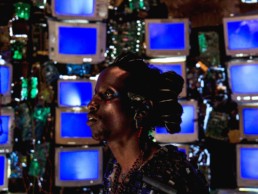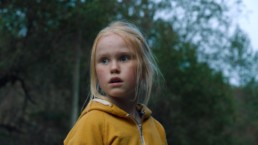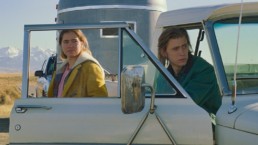'Neptune Frost' Is a Boldly Imagined Afrofuturist Sci-fi Musical
Where to watch: 'Neptune Frost' opens in Los Angeles this Friday. Now playing at the Quad and BAM in NYC.
At its core, Neptune Frost is an Afrofuturist, utopian, sci-fi musical (how's that for descriptive adjectives?). Co-directors Anisia Uzeyman and multi-disciplinary artist Saul Williams create visual and tonal poetry in this electric feature film, backed by incredibly passionate performances and musical numbers. It's a boldly imagined film that requires an attentive, open-minded audience. If that is you, then keep reading, because you're in for quite a ride.
Neptune Frost is executive produced by Lin-Manuel Miranda (tick, tick...BOOM!) and Stephen Hendel (Finding Fela). The film explores themes of exploitation, corruption, and politics through mesmerizing song and dance. Set in the East African country of Burundi, the coal miners that make up the working class use music to express their frustration with the authoritarian regime while simultaneously forming a sense of community with fellow salt of the Earth folk. "There's energy in pairing" is a common saying, meaning that banding together with their community is the only way to survive.
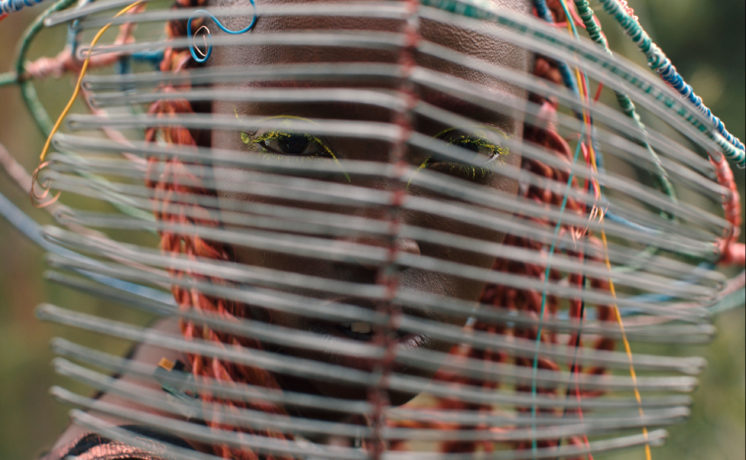
This proves true for a group of coltan miners who manage to escape and set up refuge in what can be described as an eclectic e-waste dump. Covered in technical equipment and wires, they are literally and figuratively connected to each other. However, things get thrown off course when an intersex runaway and a former coltan miner connect, resulting in a short circuit throughout the ominous "Motherboard" that is their society.
Reading between the lines (or, in this case, computer code) shows a familiar David vs Goliath tale from a futuristic, avant-garde perspective. William has his own history of creating boundary-pushing art, including publishing five books of poetry, releasing six albums, and collaborating with artists including Janelle Monae, Trent Reznor, Nas, Massive Attack, and Erykah Badu. It's no surprise that the music of Neptune Frost is absolutely dynamic and eclectic.
Beyond being an amalgamation of art, color, sound, and images, Neptune Frost also switches between Kinyarwanda, Kirundi, Swahili, French, and English languages throughout the film. Its 105-minute runtime spans entire states of being: between past and present, dream and waking life, colonized and free, male and female, memory and prescience. Its maximalist and unrestrained vision shows a world where all can live free. That's absolutely something worth singing and dancing about.
105 minutes. Distributed by Kino Lorber.
Composer Dominik Scherrer Drops Title Track from 'The Tourist'
Out of his studio in Spitalfields, London, Dominik Scherrer creates a spacious, other-worldly sound that feels far removed from any remnants of city life. The Emmy-nominated composer’s soundtrack to the six-part HBO Max series The Tourist is a sonic escape from our daily lives as he transports us to the Australian outback with slow-burning guitar melodies and layered choral vocals.
Dominik’s approach to this score was to bring the Australian desert to life, and he did so by highlighting acoustic elements like solo strings and guitars, choir, and electronically-processed percussion. Masterfully mixed, the end result is a fresh and brilliantly diverse score. The Tourist soundtrack will be released this Friday both in standard stereo and Dolby Atmos format (the latter being recommended for an optimal, fully immersive experience).
Cinemacy is thrilled to premiere “The Tourist” from The Tourist, below:
Jamie Dornan (Belfast, The Fall) stars as a nameless traveler who attempts to rebuild his life after being run off the road in a brutal car chase and, consequently, wiping his memory. Set in Australia, The Tourist is a character-driven thriller series that sees Dornan attempt to rediscover who he is. As he searches for answers about his identity, he has to contend with merciless figures from his past pursuing him.
“There are two major roles in The Tourist score," says Dominik Scherrer. "It’s almost a kind of yin and yang concept. One is the dark and brooding, unnerving one, with processed solo strings, in particular cello solos, processed vocals played through guitar amplifiers, some slowed down as well as chopped up elements. The other side is the lyrical one. I was inspired by early 19th-century hymns - I felt there was an unwritten religious tone to the script."
In addition to his TV scores, which include the Netflix/ BBC series The Serpent, Dominik also produces sound design and composition for fine art installations, most notably for artist Suki Chan. As a composer/director, he is developing a new kinetic opera for the screen called 'Hell For Leather’, which premiered at Sundance and went on to win him 10 awards.
Dubois Records is releasing the 'The Tourist' Original Soundtrack on Friday, May 20th. Pre-save here.
Karl Frid Shares Track From NEON's 'Pleasure'
An unconventional film calls for an unconventional score. Swedish composer Karl Frid creates a genre-blending soundscape, which acts as a disruption of predictability, in director Ninja Thyberg's very NSFW film, Pleasure. One could assume a film of this sexual magnitude would include fairly stereotypical syncs–slow jams like Marvin Gaye's "Let's Get It On" or porno groove music of the 70s come to mind almost immediately. But what Frid delivers reverberates with such artistry and angelic grace, it's obvious that Pleasure offers a different and refreshing view on an industry previously dominated by men.
A choir of layered, operatic voices (vocalized by Caroline Gentele) swells into an anthemic theme song in “Una Gioia Sempre Viva”, the latest track to be released from the Original Motion Picture Score. This sacred opera juxtaposes the images of overt sexual exploration and provides an interesting contrast in perception, specifically the dichotomy in how the main character views herself vs how men and society see her.
Cinemacy is thrilled to premiere “Una Gioia Sempre Viva” from Pleasure, below:
Starring Sofia Kappel as 19-year-old aspiring porn star Bella Cherry, Pleasure is a journey into the Los Angeles porn industry through the lens of a confident young woman, who is determined to reach a level of stardom at any cost.
Karl knew that he not only wanted–but needed–to attach his name to such a bold and provocative film. He says, “The female gaze on the working conditions from within this huge industry that no one wishes to speak about, let alone even acknowledge the existence of, was as liberatingly upfront and honest as provoking. I aimed to arrive at a musical universe that was not judgmental or too revealing, a process made in close collaboration with director Ninja Thyberg. The making of the film and the score has been a long journey and I’m very excited to finally share this music with the rest of the world.”
Karl Frid brings with him an admirable and vast knowledge of music, ranging from classical and jazz to Latin, hip-hop, and pop music. Frid studied classical music, with an emphasis on trombone, at the Royal College of Music in London before studying Afro-Cuban music in Havana. He is currently a member of the Swedish Latin group Calle Real, the Swedish jazz group Platina Jazz (performing original arrangements of Japanese anime music), and was a touring member of the Swedish jazz-electronica duo Koop.
'Pleasure' opens in select theaters in New York and Los Angeles this Friday, May 13. Special Q&A events with Ninja Thyberg are planned for both Los Angeles (Nuart) and New York (Angelika) following select screenings of the film.
Milan Records is releasing the 'Pleasure' Original Motion Picture Score on Friday, May 13th. Pre-order here.
'The Innocents' Bends From Coming of Age Drama to Supernatural Thriller
Where to watch: 'The Innocents' opens this Friday, May 13 at Laemmle Royal and Laemmle's Playhouse 7.
Screenwriter Eskil Vogt is stepping out from behind his recent Oscar-nominated screenplay (The Worst Person in the World) and into the spotlight as a director for the first time since 2014. Eight years after his directorial debut Blind, Vogt's reintroduction as a multi-talented filmmaker is a bold one as he channels an atmospheric and darkly surreal coming-of-age story in the Norwegian film, The Innocents.
It's often said that babies are born good; free from bias, hatred, and general erratic impulses. In a slightly contradictory stance, Vogt himself states, "I think kids are beyond good and evil, or rather, before good and evil. But I don't think children are little angels, that people are born pure. I think children are born without any sense of empathy or morals, we have to teach them that."
No matter where you personally lean on the spectrum, it's still alarming to witness seven-year-old Ida (Rakel Lenora Fløttum) sneakily abuse her older sister Anna (Alva Brynsmo Ramstad), who suffers from a type of "regressive autism." Unable to use words to communicate her pain–from forearm pinches to broken glass in tennis shoes–it's heartbreaking to watch Ida be so mean. But why is she acting out in the first place? One thought is her aggression is misplaced frustration at her family's decision to move into a new apartment complex, new school district, and forgoing any summer plans due to her father's hectic work schedule.
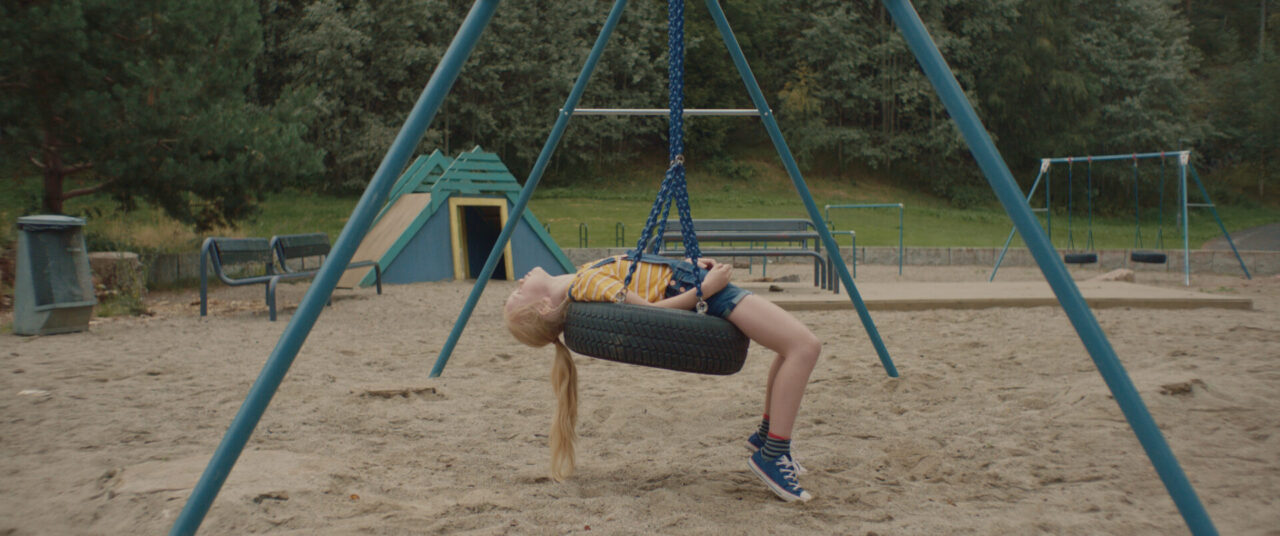
With nothing but time on her hands, curious Ida spends her sunny summer afternoons taking Anna outside, only to ditch her and explore the grounds of the apartment complex alone. This is where she meets Ben (Sam Ashraf), a boy a little older than herself. He is mysterious but troubled, as if a dark cloud looms over him constantly.
While Ida and Ben are busy making mischief, another young apartment-dwelling neighbor, Aisha (Mina Yasmin Bremseth Asheim), takes up a special friendship with Anna, seemingly able to understand what the non-verbal girl is saying. In fact, when the four of them are together, they are able to conjure up supernatural abilities that start off innocent enough but end up taking a deadly turn. It's all very suspicious.
It isn't long before the four children unite and when they do, the film seemingly shifts tone from coming-of-age drama to supernatural thriller. In a haunting display of childhood trauma being expressed by four 7–11 year-olds, The Innocents genre-bends to a disturbing degree. Beware, the animal cruelty alone is enough to make you shudder.
The Innocents isn't a traditional horror film, but more like the genre's dark and twisted cousin. Using child actors as protagonists, a minimal score, and haunting imagery, The Innocents is a hard pill to swallow but it will no doubt leave a lasting impression. Vogt–who has been a constant collaborator with filmmaker Joachim Trier–is certainly making a name for himself as a director to watch with this whiplash of a title.
1h 57m. Distributed by IFC Midnight.
https://www.youtube.com/watch?v=hm45yGSwArY&feature=youtu.be
'Montana Story' Makes Amends On The Great Plains
Our ‘Montana Story’ review was first published as part of our Toronto International Film Festival 2021 coverage.
Where to watch: 'Montana Story' opens this Friday, May 13th at the Landmark in West Los Angeles and AMC Sunset 5.
Extending an olive branch of forgiveness proves difficult when the past feels impossible to confront in Scott McGehee and David Siegel's Montana Story. A story of radical acceptance set on the vast Americana plains (with a similar aesthetic to this year's Best Picture winner Nomadland), Montana Story is a richly layered familial drama that will leave audiences thinking about the importance of making amends before it's too late.
Estranged half-siblings Erin (Haley Lu Richardson) and Cal (Owen Teague) are forced to make overdue reconciliations when they end up face-to-face with one another at their family ranch to be with their dying father, with whom both have complicated relationships. The distressing circumstances of the occasion do not make for an ideal reunion; the presence of a hospice nurse (Gilbert Owuor) is hard to accept and the added stress of impending bankruptcy has Cal on edge, but the unconditional love that binds a family together proves too strong to break as brother and sister work to make amends, better late than never.
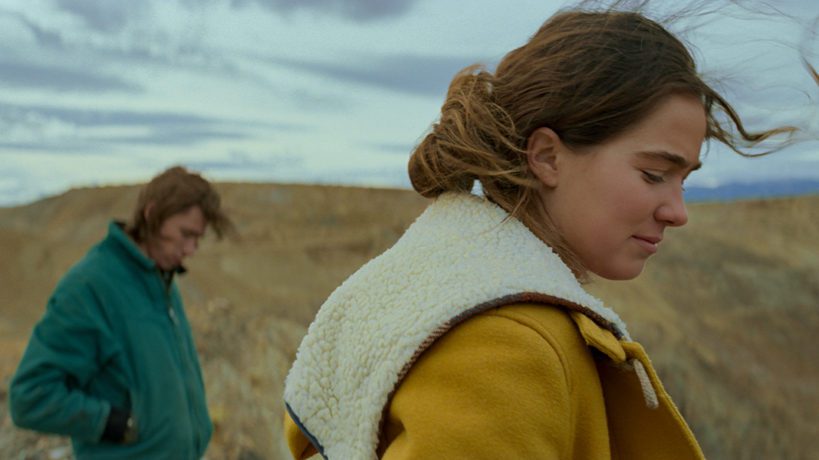
The sweeping Montana skyline is the backdrop to on-the-ground resentment and heartache and is wonderfully crafted by directors Scott McGehee and David Siegel, photographed by cinematographer Giles Nuttgens, and further illustrated through editor Isaac Hagy's keen eye for dramatic storytelling. The juxtaposition between the beautiful and ethereal nature of the environment and the gritty emotional distress of its lead actors in Teague and Richardson gives the film palpable tension. Both young actors give compelling and complex performances that will tug on your heartstrings throughout the duration of its nearly two-hour runtime and will reward you with a smile at the end.
Set to an original score by singer/songwriter Kevin Morby, Montana Story is, at its core, a film about embracing change and encouraging personal growth. Let go of the resentment that no longer serves you and focus on the beauty of life in the present moment. Because once that moment passes, we can't get it back.
In 'On the Count of Three,' Suicidal Pals Take One Last Joy Ride
Our ‘On the Count of Three’ review was first published as part of our Sundance Film Festival 2021 coverage.
Where to watch: ‘On the Count of Three’ opens this Friday, May 13th in select theaters.
Stand-up comedian Jerrod Carmichael isn't afraid to get dark and dirty in the director's chair and on-screen in his filmmaking debut On the Count of Three. Playing opposite a Robert Pattinson in Good Time-looking Christopher Abbott, the film is a tightly packaged character study that tackles sensitive subjects like mental health and suicidal thoughts while remaining slightly absurd and, at times, darkly humorous.
The responsibilities of being a "best friend" can have different meanings for different people. To Val (Carmichael), it means helping Kevin (Christopher Abbott) break out of an involuntary hold at a mental institution and create a suicide pact that would put them both out of their misery forever. It's definitely a notch above wearing matching heart-shaped necklaces. Intrigued by the idea, and just relieved to escape another day playing checkers with a schizophrenic, Kevin obliges, and the two make their getaway to end their lives.
Just as the boys are about to pull the trigger on each other, Kevin panics as he realizes that he wants a couple more hours to wrap up unfinished business in his personal life. Val agrees, and a "Save The Date" for their double suicide is set for later that night. Their last joyride is anything but joyous.
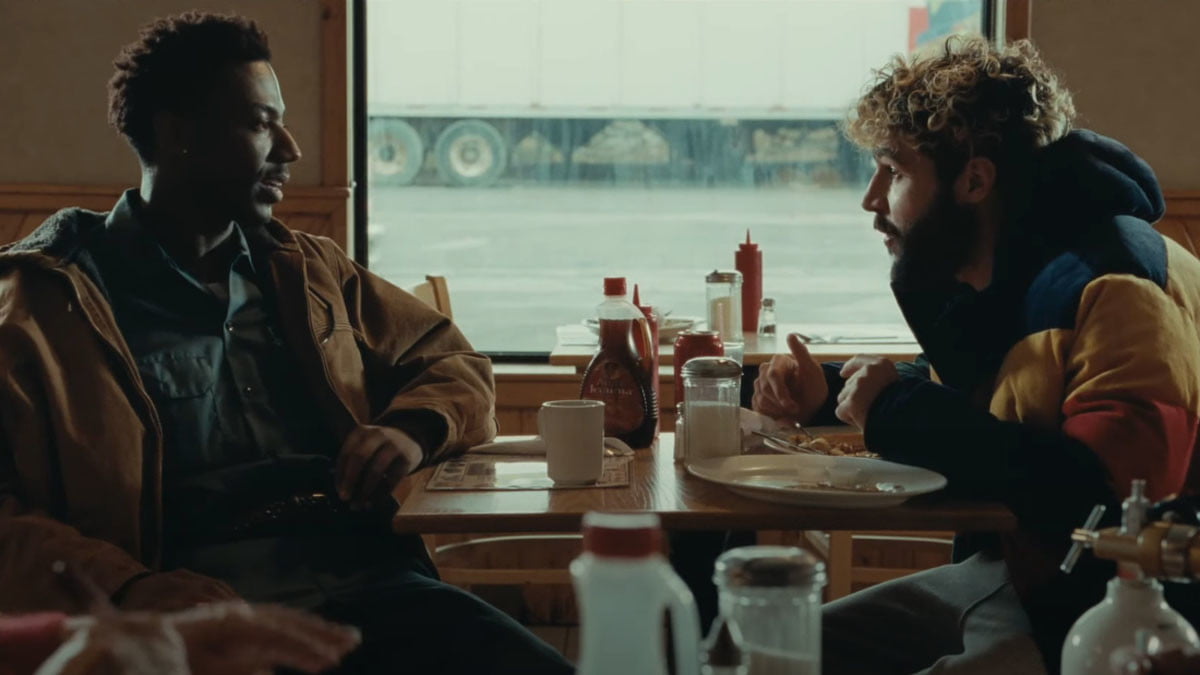
Blasting Papa Roach's Last Resort, Val and Kevin leave a trail of destruction in their wake as they visit people from their past to either make amends or kick their ass, there is no in-between. Comforted by knowing there are no repercussions for a dead person, their actions become increasingly outrageous and careless. But it's not long until Val gets disillusioned with the idea of death and starts second-guessing his own suicide pact.
With its Thelma & Louise-like shenanigans mixed with the graphicness of a David Cronenberg film, On The Count of Three is bold. It has its funny moments but don't be fooled, this film is somber as hell. Mental health issues, childhood trauma, and walking depression are just some of the heavy themes that are woven throughout.
The cinematography by Marshall Adams captures the despair and struggle the boys are feeling. Low angle shots reminiscent of a Yorgos Lanthimos picture give the feeling of uneasiness, an off-balance dynamic between actor and audience, and we can only watch and wait for the other shoe to drop. The close-ups are also profound because it was the first time I noticed Christopher Abbott has freckles.
Aided by a beautiful score from composer and frequent Arcade Fire collaborator Owen Pallett, On the Count of Three is an existential bromance that will keep you on the edge of your seat until the very end.
1h 26m. Distributed by Annapurna Pictures.
https://www.youtube.com/watch?v=q7KFDgTySuM
'The End of Medicine' Investigates Link Between Disease and Animal Consumption
Where to watch: 'The End of Medicine' is available on VOD May 10th.
While Joaquin Phoenix and Rooney Mara have starred in many movies together, they've now teamed up to make a movie. The duo–who are as equally respected by Hollywood as they are by the animal rights community–lend their influence to a new feature-length investigative documentary called The End of Medicine. As executive producers, Phoenix and Mara team up with BAFTA-winning director Alex Lockwood (73 Cows) and producer Keegan Kuhn (Cowspiracy, What The Health) to expose a disturbing, dirty little secret that the food industry has been trying to conceal for decades.
In a swift 73 minutes, The End of Medicine draws attention to the underreported link between global disease–pandemics and antibiotic resistance included–and our (mis)use of animals. The film gets its momentum from whistleblower Dr. Alice Brough, a young vet who first grew intolerant toward the industry's "acceptable" practices of animal agriculture. As we see, Dr. Brough risks her professional career and livelihood to denounce the corruption within the industry by sharing insider information about the reality of factory farming and animal disease. Through her tears, we can clearly see how distressed she is as she talks directly to the camera, remorseful for her contributions to the industry in the past.
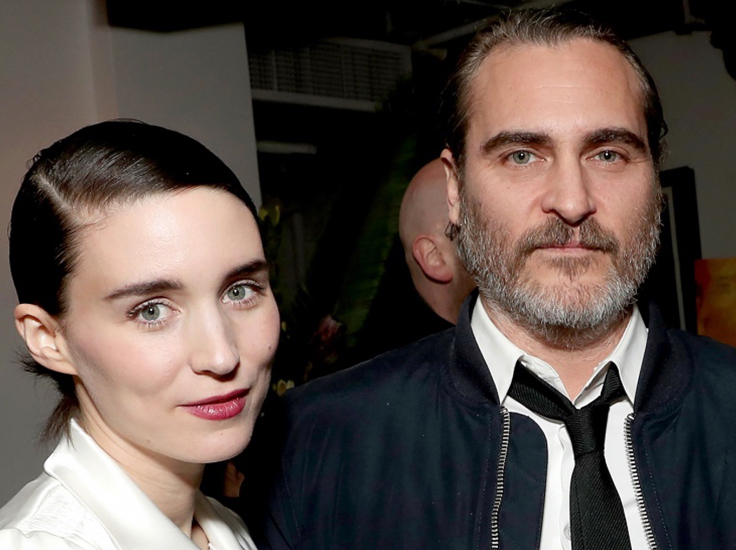
In typical call-to-action-type documentaries, The End of Medicine provides an overwhelming number of facts that are meant to shock the viewer into making immediate lifestyle changes. Industry insiders, government advisors, politicians, scientists, and leading doctors share unnerving statistics that at times, feel more hopeless than optimistic.
One claim that caused me to sit up a little straighter was hearing that 3 out of 4 emerging infectious diseases come from an animal source. This tends to happen because an animal's immune system is lowered when they're stressed, and they're stressed because they're so densely packed in cages in unsanitary conditions. It's easy for the animal, then, to catch an infection and spread it to the rest of their cage-mates and eventually, the humans who consume them. Not surprisingly, COVID was used as an example: We socially distance ourselves from other sick humans but are doing the exact opposite to animals. This film asks, "Why?"
The End of Medicine has one goal in mind, and that is to get its audience to think twice about consuming animal products. Ideally, Phoenix and Mara would be able to convince all of us to go completely vegan (but it may take a few more documentaries for that to happen). While the note the film ends on isn't the most optimistic in tone, aside from the standard "transform yourself to transform the world", its intentions are pure and worthwhile. Films like these are important, and if The End of Medicine causes you to pause before ordering the burger–even for a moment–then it's done its job.
In 'Anaïs in Love,' A Charming Young Parisian Falls Into a Complex Affair
Where to watch: 'Anaïs in Love' is now playing at Laemmle Theaters.
For a French romantic comedy about a thirty-something woman falling in and out of love in the City of Light, Anaïs in Love isn't as très chic as I expected. Set in Paris, the surrounding countryside, and a small, picturesque seaside town, what the film has in terms of baked-in natural aesthetic falls short when it comes to the story itself; specifically our protagonist's motivation for disrupting her life and those around her. If you're looking for a film that will transport you to a breezy, sun-soaked European destination, then Anaïs in Love will certainly satisfy that desire. Unfortunately, it doesn't offer much else.
Anaïs (Anaïs Demoustier) leads a very dysfunctional life. She can't afford her rent, she is too claustrophobic to take an elevator/enclosed transportation (leading her to bike and run everywhere), her mother is terminally ill, she is struggling to complete her school thesis, her unstable relationship with her boyfriend is on life support... and she just found out that she is 7 weeks pregnant despite being vocal about never wanting children.
With the entire world seemingly against her, Anaïs takes everything in stride. She is, for better or for worse, a free spirit with an "on to the next" attitude that doesn't allow her to sit in her grief for long. She finds distraction in her new quasi-relationship with older gentleman Daniel (Denis Podalydès) who she meets at a mutual friend's party. He is a book publisher, and their shared passion for literature is something they quickly bond over. However, Daniel is already in a committed relationship with his partner Emilie (Valeria Bruni Tedeschi), a well-respected author. Despite knowing this, Anaïs continues her affair with Daniel until she catches a glimpse of the blonde beauty and decides that it is Emilie who she wants after all.

Much like the character of Anaïs, the film is, at times, a bit messy. Movement is a central theme here, from Anaïs' constant running in scenes to emotionally skirting away from reality. However exhausting it might be to watch, it portrays Anaïs' emotional state quite well: this is a girl who doesn't know what she wants. I wish we were given more insight as to why Anaïs is as she's portrayed to be. Without any context, it feels as if "quirky" was the only personality trait she was given.
Anaïs's claustrophobic trait is an interesting one, especially when speaking metaphorically. The confines of any sort of boundary–whether it be physical walls or a metaphorical code of ethics–causes Anaïs to react like a wild dog in a cage. She pushes back much harder than she should and her actions have consequences that we, unfortunately, never see played out in the film. She cheats on her boyfriend and makes an important decision about her pregnancy, yet we never see how he deals with the news. Was he ever told? We don't know.
Despite the character development shortcomings, director Charline Bourgeois-Tacquet's Anaïs in Love is a charming, albeit manic, depiction of a complicated young woman at a crossroads in her life.
1h 38m. Distributed by Magnolia Pictures.

